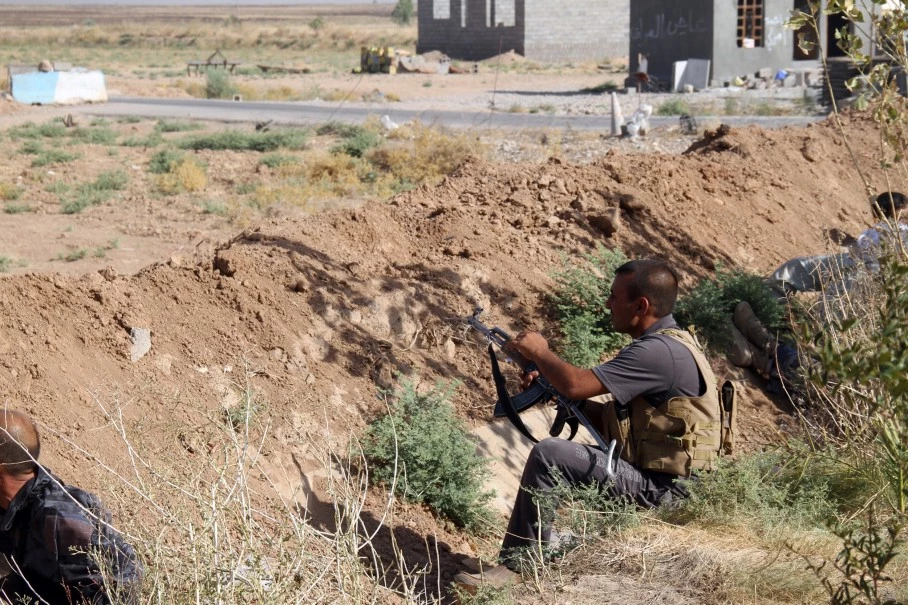
Wednesday August 27, 2014

A Iraqi Turkmen Shiite fighter, who volunteered to join the government forces, holds a position in Amerli, 100 miles north of Baghdad, as the city has been completely surrounded by Islamic State Sunni militants for more than six weeks.
We’re caught in a revenge cycle with a death cult, and it’s redefining modern warfare.The horrific murder of journalist James Foley is case in point. Once, hitting targets of opportunity or instituting a propaganda campaign were peripheral to massed armies killing each other in trenches and cities and jungles. To win, one country crushed another’s will to fight by destroying the widest possible number of targets: fleets, soldiers, cities.
No more. After a century and a half of industrial anonymous bloodshed, the individual is key. The Islamic State attacked America when it killed Foley, without a bomb or mass slaughter.
Since Sept. 11, we’ve been at war not with Pakistan or Afghanistan, but with specific terrorist leaders and materiel experts. They have reciprocated, attacking either symbolic targets or those soldiers that pose the greatest threat.
That the United States has adopted this strategy is not news. Long campaigns in Iraq and Afghanistan taught us that detaining or killing every bottom-rung trigger-puller just made the insurgency worse. Islamic State leader Abu Bakr al-Baghdadi was caught in such a round-up in 2004.
We now use drones or small special operations teams to hit financiers or suppliers or bomb-makers. President Obama expanded the use of Predator strikes in Yemen and Pakistan. He authorized SEAL and Delta Force raids in Libya and Somalia. The hunt for Osama bin Laden was prominent but not unusual; similar smaller operations are undertaken daily. If the strike is successful, it makes the news for one cycle. If not, we hear little. In either case, the resources expended are minimized, but so is the public’s knowledge of the actions taken on our behalf.
Here’s what’s new. The enemies we’re fighting – al-Qaeda affiliates, the Taliban, the Islamic State – have learned to be equally selective in reverse. In 2007, at the height of the surge in Iraq, IED-disarming bomb technicians were seven times more likely to be killed in combat than average soldiers. As the surge progressed, and even as the death rate stabilized or even decreased overall, it doubled for bomb techs. Similar ratios played out during the surge in Afghanistan.
This can’t be explained by contrasting the relevant danger in any particular job; plenty of soldiers walk and drive in minefields. Rather, an increasing percentage of IEDs were designed not for mass casualties, but rather to give the trigger-man maximum control over who he killed. And killing bomb techs eliminated specialists
Other high-value targets within the U.S. military saw a similar increase in their casualty rate. The “green on blue” attacks in Afghanistan (shootings by local soldiers on their supposed NATO allies) allowed insurgents to target individuals, like Major General Harold Greene, the highest ranking officer killed in the war. In Jake Tapper’s book “The Outpost,” the story of the counter-insurgency campaign in Nuristan province, only one remote-controlled IED ever appears, and it is used specifically to assassinate Captain Rob Yllescas, killed because he was so adept at befriending the local elders.
And now, with the videotaped beheading of James Foley, we can see the entire process in gruesome miniature. Iraq is imploding. The United States launches airstrikes, targeting columns of Islamic State troops, but also specific leaders within the organization. The Islamic State strikes back against the most prominent target available to them, James Foley. They kill James and call on his brother John, an officer in the Air Force, to stop the bombing, threatening that another journalist, Steve Sotloff, will be killed. We have intelligence on the executioner, a “Beatle” from Britain now identified as Abdel-Majed Abdel Bary, and we will surely now target him.
War is reverting to a perversion of classical single combat. Foley was a tragic unwilling participant, executed for the crime of being American. But even for the champions that volunteer, the burden we as a country ask each soldier to bear, always large, is growing heavier. No more myth of fighting dehumanized “enemy combatants.” We send our forces to kill specific men with faces and families and names known to them, if not to us.